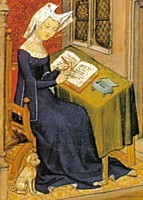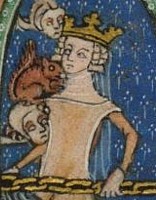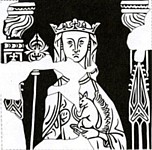|

Medieval
Pets
DOGS - CATS - SQUIRRELS - SONG BIRDS
 Medieval
women, like women today, were avid pet-keepers. Pets were defined
as those animals kept in the inner chambers of a woman's home
or personal space which have no other practical purpose than that
of companionship. Medieval
women, like women today, were avid pet-keepers. Pets were defined
as those animals kept in the inner chambers of a woman's home
or personal space which have no other practical purpose than that
of companionship.
Pets favoured by women were songbirds, small dogs (usually white
and hairy), cats and occasionally squirrels! Small long-haired
dogs can be seen in many contemporary artworks- manuscripts, effigies
and paintings.

Dogs
 Although
dogs represent fidelity and could be included in paintings in
an allegorical sense, some household accounts show expenses for
food for companion dogs rather than those used for hunting or
hawking. They were welcomed into private chambers are were kept
by nuns and cloistered women causing a certain amount of distress
to those in charge. Although
dogs represent fidelity and could be included in paintings in
an allegorical sense, some household accounts show expenses for
food for companion dogs rather than those used for hunting or
hawking. They were welcomed into private chambers are were kept
by nuns and cloistered women causing a certain amount of distress
to those in charge.
Most artworks help distinguish
lapdogs from hunting dogs by a red, leather collar with several
brass bells attached. Collars like this can also be seen on images
of pet squirrels.
A small dog was seen as an
acceptable companion for a lady as long as she did not lavish
food on it which was good enough to feed the poor. many manuscripts
show the sort of fluffy, white terrier that we are familiar with
today, even if the breed varies a little.
Seen at right is a lady riding
side-saddle with her little white dog on her lap from 1310-1320,
Leige. manuscript Stowe MS 17.

Cats
 Cats
are often seen in manuscript margins and fall into two distinct
categories- those which are pets and those which are household
cats for catching mice. Cats
are often seen in manuscript margins and fall into two distinct
categories- those which are pets and those which are household
cats for catching mice.
Household cats were usually a grey and white tabby- that is striped
(hence tabby weave) but the Lady's pet was usually a more striking
and unusal one.
The most favoured by noble ladies were specially imported Syrian
cats, ginger or ginger and white in colour. These are mentioned
in correspondence many times over; wishing to acquire, the happiness
and love that the kitten has brought and the overwhelming sadness
at the passing of their beloved pet.
The musical song of a kitten was sure to bring delight to any
lady, according to one medieval writer, Thomas de Campre.
Many poets composed elegies for the death of a noble woman's beloved
pet and it was noted that mourning for such a pet was quite normal.
Several women had constructed small tombs and these were also
noted in personal letters.

  Red
Squirrels Red
Squirrels
There are a number of medieval
manuscripts which show women with pet squirrels.
Like
cats and dogs, they are often shown wearing a red collar and small
bells, much like that of a dog or a cat.
The detail at right, is from an English manuscript from the 14th
century, the Luttrell Psalter, shows an image of the lady
out in a covered carriage with her pet squirrel on her shoulder.
The detail from the floor tile shown, at left, shows a floor tile
of a noble woman wearing a coronet with her pet squirrel on her
hand.
 Squirrels
are often shown in medieval manuscripts with their own little
squirrel house, which is much like a bird house, only bigger. Squirrels
are often shown in medieval manuscripts with their own little
squirrel house, which is much like a bird house, only bigger.
The squirrel shown in the
Book of Hours possesed by Anne of Bohemia is belevd to be of Flemish
work and dated to between of 1382 and 1394. Unlike others, it
is lower set, but it had an arched door and trefoil windows with
fancy finials on the roof.

 Song
Birds Song
Birds
Song birds were also fashionable
pets and pet shops listed an extensive variety of birds which
were available. These ranged from the little sparrow to more exotic
types of songbird. These included parrots, thrushes, sparrows,
nightingales, starlings, doves, finches, skylarks and surprisingly,
magpies. Parrots were the most exotic of these but can be found
in several manuscripts.
There were guildmakers to
regulate the makers of birdcages which could be quite ornate.
Tax records for bird-sellers and cage-makers appear as early as
1292 in Paris.

Copyright
© Rosalie Gilbert
All text & photographs within this site are the property of
Rosalie Gilbert unless stated.
Art & artifact images remain the property of the owner.
Images and text may not be copied and used without permission.
|